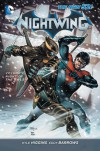Currently reading
The Sea of Monsters
Paladin of Souls
Batman: The Night of the Owls
Nightwing, Vol. 2: Night of the Owls
 I highly enjoyed this book. It’s the first in a series, but the second book hasn’t come out yet. In a way, I wish I had waited since now I am anxious to see what happens with Nina and her friends. I hate starting a series I really like that’s only one or a couple books into the story. I get impatient to read the rest of the story, and this series’ next book won’t be out until 2012. Hopefully before the world ends.
I highly enjoyed this book. It’s the first in a series, but the second book hasn’t come out yet. In a way, I wish I had waited since now I am anxious to see what happens with Nina and her friends. I hate starting a series I really like that’s only one or a couple books into the story. I get impatient to read the rest of the story, and this series’ next book won’t be out until 2012. Hopefully before the world ends. This book centers around fifteen-year-old Nina Oberon. A girl who lives in a dystopian utopia that has taken away most rights from the people, especially women who are treated more like cattle than humans. At sixteen, girls are forced to get the tattoo XVI on their wrists showing that they are “ready” for sex.
The public in general is carefully fed what the Governing Council wants them to believe including the idea that sixteen-year-old girls are nothing more than sex-starved nymphs who deserve whatever happens to them. The girls themselves—referred to as “sex-teens”—often buy into this same line of thought, prepping themselves to become what the media portrays them to be.
Nina diffidently rebels against this, not wanting to have anything to do with lecherous boys and men or forced sex. Despite the constant surveillance they’re under, Nina’s mother instills values in Nina, telling her that there’s more to life than what the GC force-feeds them. Then, her mother is murdered, and Nina finds herself finding out thrown into another world where she learns more about her mother, her presumably deceased father, and the rebel world beneath their “utopia.”
This was refreshing for a number of reasons. Firstly, I liked Nina very much, which is saying something for the character for me. Lately, I haven’t been too terribly impressed with YA protagonists, especially their female protagonists. I’ve found more of them annoying than truly admirable. Authors seem to overplay the traits that make teens who they are thus throwing them into a category that makes them overly aggravating. This shadows their admirable qualities.
Nina is a typical teen. Yes, she has traits that make her annoying like other teens, but they’re not overworked. She’s a good kid with a good heart. She knows she’s worth more than what the media says she is, but she has to be careful about expressing her opinions. She’s a good big sister to her younger sister, Dee, and she loves her grandparents. She goofs off with her friends—one of whom is a sex-obsessed girl who is completely taken by the media. But she is likable.
Secondly, I liked the world. It’s a dystopian utopia where no one supposedly has to do without unless they decide that they’d rather not take any government assistant. While things like religion repression is outlawed and everyone is a vegetarian (and Nina can’t believe there was a time when people actually ate meat), history has been erased to suit the GC’s agenda, not to mention the way it treats its teenage girls.
Yes, it is very reminiscent of 1984, but Karr worked it to her advantage, and in mentioning some of the changes that the world has gone through over time, you see that it went through many changes including having a period where women ruled that supposedly didn’t work out before deciding the former United States needed to be policed strictly.
I also liked hat Karr tried to create a lingo for teens in 2150 A.D. and the whole world in general. But I couldn’t help laughing a little at cars being called “trannies.” When I first read about a couple of “trannies” bumping into each other, I had mental images of Chi Chi Rodriguez and Noxeema Jackson running into each other and falling out in the street.
There were parts of the story that were too coincidental or convenient, but that happens in YA books (and many adult books). However, I can see where it was needed to set off a chain of events. I'm hoping the later books will go into why teenage girls are the focus of so much misogyny in this society, but we shall see. Overall, though, I thought this was a great book and can’t wait to continue with the series. It’s been a while since I was this excited about a YA book.






